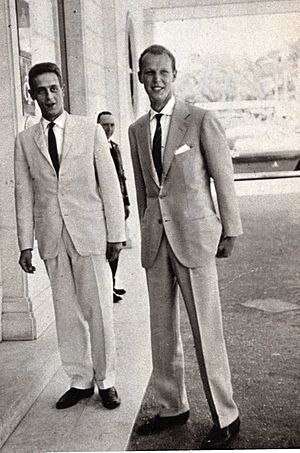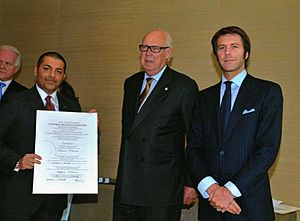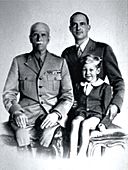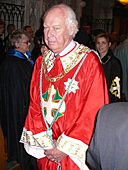Vittorio Emanuele, Prince of Naples facts for kids
Quick facts for kids Vittorio Emanuele |
|||||
|---|---|---|---|---|---|
| Prince of Naples Duke of Savoy (disputed) |
|||||
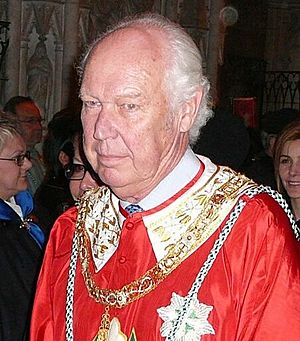
Vittorio Emanuele in 2013
|
|||||
| Head of the House of Savoy (disputed) |
|||||
| Period | 18 March 1983 – 3 February 2024 | ||||
| Predecessor | King Umberto II | ||||
| Successor | Prince Emanuele Filiberto | ||||
| Born | 12 February 1937 Naples, Kingdom of Italy |
||||
| Died | 3 February 2024 (aged 86) Geneva Cantonal Hospital, Switzerland |
||||
| Burial | Basilica of Superga | ||||
| Spouse |
Marina Doria
(m. 1971) |
||||
| Issue | Emanuele Filiberto, Prince of Venice | ||||
|
|||||
| House | Savoy | ||||
| Father | Umberto II of Italy | ||||
| Mother | Marie-José of Belgium | ||||
Prince Vittorio Emanuele of Savoy, Prince of Naples (Vittorio Emanuele Alberto Carlo Teodoro Umberto Bonifacio Amedeo Damiano Bernardino Gennaro Maria di Savoia; 12 February 1937 – 3 February 2024), was the only son of Umberto II, the last King of Italy, and his wife Marie-José of Belgium. Vittorio Emanuele also used the title Duke of Savoy and claimed the headship of the House of Savoy. These claims were disputed by supporters of his third cousin, Prince Amedeo, Duke of Aosta, and later by Amedeo’s son, Aimone.
He lived for most of his life in exile, following the constitutional referendum of 1946 which affirmed the abolition of the monarchy and the creation of the Italian Republic.
Contents
Early life and family
Vittorio Emanuele was born 12 February 1937 in Naples to Umberto, Prince of Piedmont, who would later become the last King of Italy as Umberto II, and Princess Marie-José of Belgium. When Umberto II left Italy after the monarchy was abolished by the 1946 Italian institutional referendum, the remaining members of the House of Savoy lived in exile, mostly in Switzerland and on the Portuguese Riviera, though the former king Victor Emmanuel III, grandfather to Vittorio Emanuele, lived in Egypt until his death in 1947. Following the separation of the exiled ex-King and ex-Queen, Vittorio Emanuele lived with his mother on an estate in Merlinge, Switzerland. Vittorio Emanuele and his family resided in Geneva.
After an eleven-year relationship, Vittorio Emanuele married Swiss biscuit heiress and world-ranked water skier Marina Doria in Tehran, Iran, on 7 October 1971, at the occasion of the 2,500-year celebration of the Persian Empire. Coincidentally, Vittorio Emanuele and his wife Marina share a birthday (12 February) but Vittorio Emanuele is two years younger than Marina (she was born in 1935).
Vittorio Emanuele worked as a banker and an aircraft salesman, and then an arms dealer.
Vittorio Emanuele had one son, Prince Emanuele Filiberto of Savoy, Prince of Venice, born on 22 June 1972, who has two daughters.
Duke of Savoy
On 7 July 2006 Vittorio Emanuele's kinsman and dynastic rival, Amedeo, 5th Duke of Aosta declared himself to be the head of the House of Savoy and Duke of Savoy, claiming that Vittorio Emanuele had lost his dynastic rights when he married without the permission of Umberto II in 1971. Amedeo received the support of the President of the Council of the Senators of the Kingdom Aldo Alessandro Mola and Vittorio Emanuele's sister, Maria Gabriella.
Vittorio Emanuele and his son applied for a judicial injunction to forbid Amedeo from using the title "Duke of Savoy". In February 2010, the court of Arezzo ruled that the Duke of Aosta and his son must pay damages totalling €50,000 to their cousins and cease using the surname Savoy instead of Savoy-Aosta. However, the verdict was overturned on appeal, with the court of second resort allowing Amedeo the use of the short surname, in the form of di Savoia, and additionally revoking the financial penalty originally imposed on him.
Exile from and return to Italy
Reasons for exile
In line with certain other countries that were formerly monarchies (such as France or Romania), the Italian Constitution required all male members of the House of Savoy to leave Italy and barred them from ever returning to Italian soil again. This was enacted as a "temporary disposition" enacted when the constitution was promulgated in 1948. The constitution also forbade any amendment that would change the republican form of government, effectively foreclosing any effort to restore the monarchy short of adopting a new constitution.
Requests for return
Vittorio Emanuele lobbied the Parliament of Italy over the years in which the law prohibiting his return was in force, to be allowed to return to his homeland after 56 years in exile. In 1999, he filed a case at the European Court of Human Rights, in which the Prince charged that his lengthy exile violated his human rights. In September 2001, the court decided to hold a hearing on the case at a date later to be fixed.
In order to achieve a return to his homeland, he renounced any claim to the defunct throne and to Italy's crown jewels. He publicly assured the Italian government that the nation and the crown properties, confiscated by the State in 1946, "are no longer ours", referring to the House of Savoy. "For that matter we have no claim on the Crown jewels", he said. "We have nothing in Italy and we are not asking for anything". Vittorio Emanuele also dropped his case at the European Court of Human Rights. In February 2002, Vittorio Emanuele and his son Emanuele Filiberto wrote a signed letter, published through a law firm, in which they formally expressed their loyalty to the Constitution of Italy.
Return to Italy
On 23 October 2002, the provision in the constitution that barred male members of the former royal house from returning to Italy was repealed. As part of a deal with the government, Vittorio Emanuele signed an agreement renouncing all claims to the defunct throne and recognizing the Republic as the only lawful government of Italy. Vittorio Emanuele was permitted to re-enter the country on 10 November 2002. On 23 December 2002, he made his first trip home in over half a century. On the one-day visit he, his wife, and his son had a 20-minute audience with Pope John Paul II at the Vatican.
Upon their first visit in 2003 to Naples, where Vittorio Emanuele was born, and from where his family sailed into exile in 1946, the reception of the Savoys was mixed; most people were indifferent to them, some hostile, a few supportive. The media reported that many in Naples were not happy to see the return of the family, when hundreds of noisy demonstrators chanted negative slogans as they progressed through the city. Demonstrations were staged by two traditionally opposing factions: anti-monarchists on one hand, and supporters of the House of Bourbon-Two Sicilies, the royal house deposed when Italy was united in 1861 under the House of Savoy.
Death
Vittorio Emanuele died in Geneva Cantonal Hospital, Switzerland on 3 February 2024, at the age of 86. A statement from the Royal House of Savoy gave the time of his death as 07:05 (CET).
Succession
In June 2023, his son Emanuele Filiberto, Prince of Venice, announced his intention to renounce his claim to the throne in favour of his daughter, Princess Vittoria of Savoy, when he feels she is ready to succeed. Until he formally does so, he remains as his father's heir.
Honours
| Styles of Prince Vittorio Emanuele |
|
|---|---|
 |
|
| Reference style | His Royal Highness |
| Spoken style | Your Royal Highness |
National dynastic honours
Vittorio Emanuele was the Sovereign of the Dynastic Orders of the House of Savoy which consist of:
 House of Savoy: Sovereign Knight of the Royal Supreme Order of the Most Holy Annunciation
House of Savoy: Sovereign Knight of the Royal Supreme Order of the Most Holy Annunciation House of Savoy: Sovereign Knight Grand Cross of the Royal Order of Saints Maurice and Lazarus
House of Savoy: Sovereign Knight Grand Cross of the Royal Order of Saints Maurice and Lazarus House of Savoy: Sovereign Knight Grand Cross of the Royal Order of the Crown
House of Savoy: Sovereign Knight Grand Cross of the Royal Order of the Crown House of Savoy: Grand Master of the Royal Civil Order of Savoy
House of Savoy: Grand Master of the Royal Civil Order of Savoy House of Savoy: Grand Master of the Royal Military Order of Savoy
House of Savoy: Grand Master of the Royal Military Order of Savoy House of Savoy: Grand Master of the Royal Order of Merit of Savoy
House of Savoy: Grand Master of the Royal Order of Merit of Savoy
National honours
 Sovereign Military Order of Malta: Bailiff Knight Grand Cross of Justice of the Sovereign Military Order of Malta, Special Class
Sovereign Military Order of Malta: Bailiff Knight Grand Cross of Justice of the Sovereign Military Order of Malta, Special Class Two Sicilian Royal Family: Bailiff Knight Grand Cross with Collar of Justice of the Two Sicilian Royal Sacred Military Constantinian Order of Saint George
Two Sicilian Royal Family: Bailiff Knight Grand Cross with Collar of Justice of the Two Sicilian Royal Sacred Military Constantinian Order of Saint George
Foreign honours
 Greek Royal Family: Knight Grand Cross of the Royal Order of the Redeemer
Greek Royal Family: Knight Grand Cross of the Royal Order of the Redeemer Monaco: Knight Grand Cross of the Order of Saint-Charles
Monaco: Knight Grand Cross of the Order of Saint-Charles Montenegrin Royal Family: Knight of the Order of Petrović Njegoš
Montenegrin Royal Family: Knight of the Order of Petrović Njegoš Montenegrin Royal Family: Knight Grand Cross of the Royal Order of Prince Danilo I
Montenegrin Royal Family: Knight Grand Cross of the Royal Order of Prince Danilo I Montenegrin Royal Family: Knight of the Order of Saint Peter of Cetinje
Montenegrin Royal Family: Knight of the Order of Saint Peter of Cetinje Empire of Iran: Recipient of the Commemorative Medal of the 2,500-year celebration of the Persian Empire
Empire of Iran: Recipient of the Commemorative Medal of the 2,500-year celebration of the Persian Empire
Ancestry
| Ancestors of Vittorio Emanuele, Prince of Naples | |||||||||||||||||||||||||||||||||||||||||||||||||||||||||||||||||||||||||||||||||||||||||||||||||||||||||||||||||||||||||||||||||||||||||||||||||||||||||||||||||||||||||||||||||||||||||||||||||||||||||||||||||||||||||||||||||||||||||||||||||||||||||||||||||||||||||||||||||||||||||
|---|---|---|---|---|---|---|---|---|---|---|---|---|---|---|---|---|---|---|---|---|---|---|---|---|---|---|---|---|---|---|---|---|---|---|---|---|---|---|---|---|---|---|---|---|---|---|---|---|---|---|---|---|---|---|---|---|---|---|---|---|---|---|---|---|---|---|---|---|---|---|---|---|---|---|---|---|---|---|---|---|---|---|---|---|---|---|---|---|---|---|---|---|---|---|---|---|---|---|---|---|---|---|---|---|---|---|---|---|---|---|---|---|---|---|---|---|---|---|---|---|---|---|---|---|---|---|---|---|---|---|---|---|---|---|---|---|---|---|---|---|---|---|---|---|---|---|---|---|---|---|---|---|---|---|---|---|---|---|---|---|---|---|---|---|---|---|---|---|---|---|---|---|---|---|---|---|---|---|---|---|---|---|---|---|---|---|---|---|---|---|---|---|---|---|---|---|---|---|---|---|---|---|---|---|---|---|---|---|---|---|---|---|---|---|---|---|---|---|---|---|---|---|---|---|---|---|---|---|---|---|---|---|---|---|---|---|---|---|---|---|---|---|---|---|---|---|---|---|---|---|---|---|---|---|---|---|---|---|---|---|---|---|---|---|---|---|---|---|---|---|---|---|---|---|---|---|---|---|---|---|---|
|
|||||||||||||||||||||||||||||||||||||||||||||||||||||||||||||||||||||||||||||||||||||||||||||||||||||||||||||||||||||||||||||||||||||||||||||||||||||||||||||||||||||||||||||||||||||||||||||||||||||||||||||||||||||||||||||||||||||||||||||||||||||||||||||||||||||||||||||||||||||||||
Patrilineal descent
| Male Ancestors of Vittorio Emanuele, Prince of Naples |
|---|
|
Vittorio Emanuele's patriline is the line from which he is descended father to son. Patrilineal descent is the principle behind membership in royal houses, as it can be traced back through the generations, which means that Vittorio Emanuele is a member of the House of Savoy.
|
Gallery
See also
 In Spanish: Víctor Manuel de Saboya (1937-2024) para niños
In Spanish: Víctor Manuel de Saboya (1937-2024) para niños


